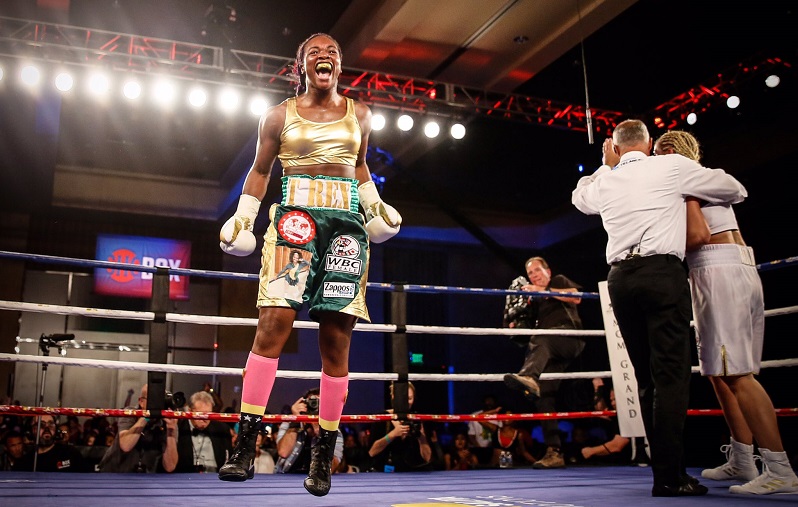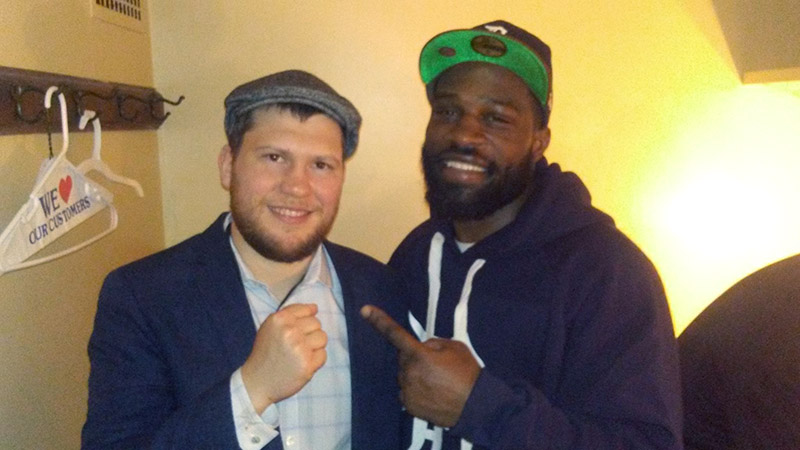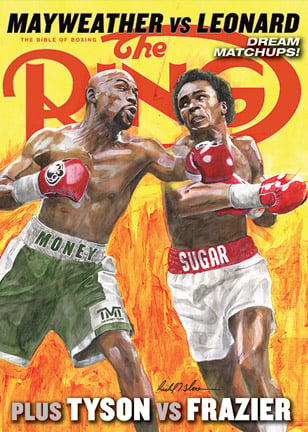Detroit boxing is on the comeback trail

He remembers being 10 years old, watching, listening, taking it all in.
Soaking it up because, as Javan “Sugar” Hill tells me, “I didn’t know nothin’.”
It was the ’80s…’81, ’82, the colors, they were as powerful and prouder than any gang colors.
Those wearing the colors didn’t need a .45 to drop you; the hands were enough.
You wore Kronk gear, and it was known that you were somebody. Sure, maybe some shirts got out to friends and family but the gear wasn’t at every Modells.
“I was watchin.’ Learnin’,” Hill tells me. “If you were wearing Kronk, you couldn’t go out and buy. You wore it if you were part of it, part of the crew.”
We are comparing and contrasting, as older folk sometimes do, then, and now. If IT, the Detroit boxing scene, was “10” then, what is it now?
Hill contemplated, dialed the Wayback Machine of his mind and sought to recall when lightweight Hilmer Kenty, born in Texas, became Emanuel Steward’s first world champ.
Allow me to help, Sugar (Steward’s nephew, whose mom Laverne was Manny’s younger sister).
On March 2, 1980, more of the boxing world saw those colors, saw that name, “Kronk.” Red and gold, choices contextually linked to the sweet and savage science. Blood red and gold. You are going to give some to get some.
Sugar Hill was Javan then, a quiet lad. He looked up to Manny, his uncle, who had an outsized personality, rat-a-tat talker, quick with a grin, able to make a new acquiantance feel like they were destined to be best friends.
The WBA lightweight title was up for grabs, and Kenty, fighting in front of his people, at Joe Louis Arena, scored a TKO, 2:52 of round nine. He took the Venezuela Ernesto Espana’s title, and yeah, he had that Kronk build. No weightlifting muscles, rubber-band man snap. “You had to be impressed with Hilmer Kenty’s speed of hand. Speed of feet too,” said Howard Cosell, calling the blow-by-blow and doing color commentary for TV.
A 10, THEN
So that was in Sugar’s mind, when Detroit boxing was a “10.” You can argue; you could scan the timeline, when Kronk had more crown-holders. However all who were there agreed, something was special there. Kronk and Crew gave the people of Detroit something to crow about, when the Lions were unable to roar. The NFLers went 2-14 in 1979. The Red Wings weren’t making the NHL playoffs then. The Pistons were putrid, stinking up their NBA joint to the tune of 16-66 in 1979-1980. The Bobs, Lanier and McAdoo, liked to score but a team effort vibe was lacking. Not so at Kronk; Steward built a “We Are Family” vibe; Javan watched and thought it would always be at a “10” level, maybe, because a 10-year-old hasn’t seen enough life cycles to know about reality.
Today “Sugar,” what is the Detroit boxing scene today, if 1980 was “10”?
He pauses, ponders: “Five…past five.”
He cites undefeated two-division female titlist Claressa Shield’s emergence, her two Olympic golds, and grabbing titles as a 6-0 (with 2 knockouts) pro, and promoter Dmitriy Salita’s push to restore prominence to the area, as drivers in the resurgence.
The Flint, Michigan, boxer, age 23, won the vacant IBF 168-pound crown and WBC title at the MGM Detroit, in August of 2017, and Hill saw it. “That place went crazy; it was a small place but it was electric. It was crazy but to get to ’10,’ we just need somethin’ else. We got sparks; we need a lil’ more wind.”

Claressa Shields celebrates her fifth round TKO win over Nikki Adler for the WBC and vacant IBF women’s super middleweight titles on August 4, 2017. Photo credit: Stephanie Trapp/TrappPhotos/Showtime
The ex-fighter-turned-promoter Salita has been collecting kindling, and persistently working to build the bonfire. “It’s one of America’s greatest cities for historic world champions,” Salita says. “As the city is coming back and is dubbed ‘America’s Comeback City,’ that theme is very close to the heart of fight fans. I am very happy about the progress we’ve made in a short period of time. Detroit has all the ingredients to be one of the East Coast-Midwest hubs of professional boxing, like New York, Chicago and Atlantic City, New Jersey, but with its own homegrown talent.” Fighters have been crossing oceans to touch down in Detroit, learn intricacies of craft and get seasoning on Salita’s shows, mostly in Detroit, and also on cards which feature talent showcased on Showtime’s “ShoBox” series.
Umar Salamov (from Russia, age 21, light heavyweight); Aslambek Idigov (from Russia, age 22, light heavyweight) and Apti Davtaev (from – wait for it – Russia, age 29, heavyweight) are edging up ranks, like the Kentys and McCrory Brothers and such did in the ’70s. The world has changed radically however and Salita, who was born in Ukraine, and lived for decades in Brooklyn, is working within the construct of what it is now, rather than trying to use a recipe from an old cookbook.
The Detroit downturn, boxing-wise, correlates pretty well with the economic impact that was spurred by the shuttering of factories and manufacturing centers in America. Labor is cheaper overseas, where those pesky unions aren’t agitating for a living wage for their people. That combined with some flabby minds doing oversight, and some subpar product being churned out by poor innovators, had Detroit losing its status as the most muscular vehicle birthplace on the planet. Hill recalls Kronk changed when the world got flatter, and the U.S. wasn’t as much the be-all/end-all in manufacturing of boxers either. So while Kronk had killer amateur teams from the late-1990s into the later mid-2000s, Steward himself had to travel to where the talent was. More recent boxing fans recall that Manny linked up with Wladimir Klitschko, and thus found himself in Kiev, in Germany, wherever the younger Klitschko brother was doing work.
It goes without saying but it must be said that Steward’s passing slammed the era shut. Hill lived with him for 35 years, “as if he was my father,” and was hit in the heart as hard as anyone, when the sage succumbed to cancer in 2012. And many assumed Javan would seamlessly take the reins, take all the knowledge Manny had passed down and start a rebuild push. “I knew I wasn’t ready to be in control,” Hill told me. “I knew it would take time. I continue to learn.”
Hill worked as a cop, from 1996 to 2007, so of course, he wasn’t set up to be a Manny clone. No one was or is, in fact. Steward’s widow Marie chatted with me a few weeks ago, briefly, and I was telling her how special he was, in that he had the ability to make anyone in his orbit feel special. That is maybe the most useful talent of any, given by God or fate. Maybe his best skill was being able to build up the esteem of a kid who maybe had a cruddy home life. This, he’d imply, and look at the dingy basement joint that always felt like it was 95 degrees because there was no ventilation, as home. And at home, the Kronk kids would beat the stuffing out of each other. No sparring partners were needed – hello – because the partners who help you learn are your brothers. We are family, and, yes, sometimes family fights.
NO ONE CAN REPLACE A STEWARD BUT SALITA TAKES LEADER ROLE
So anyway, to rebuild, it would take more of a village effort. Enter Salita, who got to know Steward in 2010. Salita got a title crack against Amir Khan, a year earlier, but got caught cold with a power shot early. He was seeking an aide in rebuilding his psyche as much as his fighting style. “Jimmy O’Pharrow, who ran Starrett City, called Emanuel and asked him to help me after the Khan fight,” Salita says. “I started coming to Kronk and training with Emanuel and Sugar Hill. Sugar was the guy that did most of the day-to-day work in the gym, and we developed a fighter-trainer relationship and friendship.” Salita then started dipping toes, and then his whole body, into the promotional waters. He started the “Brooklyn Brawl” series. New York is the capital city of the world but oft-inhospitable to smaller businesses. Salita did well in getting buzz for the BB series but the pull of Detroit, and that comeback kid vibe, sucked him in.

Demetrius Banks (right) with “Detroit Brawl” promoter Dmitriy Salita. (Photo: Facebook)
Another person who can speak to where Detroit boxing was – and is – is Frank Garza, one of the most respected referees in the game. He’s a former member of the Michigan Athletic Board of Control, and forerunner of the Michigan Unarmed Combat Commission.
“Is Detroit boxing dead? In all honesty, it’s not what it once was but it’s far from being dead, as most people believe. In my opinion I would say Detroit is limping away on crutches, and is in need of some rehab. It has suffered several major setbacks in the last decade, the closing of Fight Night Promotions (promoter Bill Kozerski), the untimely death of Emanuel Steward, the collapse of the old Kronk Gym building (Kronk closed in 2006, and a version reopened in 2015) and the inability of the Michigan legislature to pass meaningful regulation. To properly speak of Detroit boxing, I believe it is only fair to include the entire state of Michigan in the conversation. That is only fair in the sense that we have had many outstanding boxers and world champions that have come from outside the city limits. Boxers like Stanley Ketchel, the Mayweathers, the Byrd family and many more. But today we’re not seeing the numbers of boxers from outside Detroit like we once did, and it could be that shows that once occurred in Auburn Hills, Pontiac, Flint, Lansing, Muskegon and Grand Rapids, etc. are now basically nonexistent, which now brings us to Detroit. Those boxers like Claressa, who look to develop professionally, really only had Detroit as their in-house source, which relied on a local audience. It’s true that, every now and then, a major televised fight card would come to Detroit, featuring someone the likes of (Cornelius) ‘K9’ Bundrage, the Dirrells or a promotion that needed a last-minute venue but none that I can recall that initiated a follow-up appearance of championship boxing. That is until Salita Promotions came onto the Detroit scene.”
Now, human nature being what it is, many people resist the new. They see negatives, instead of people acting pragmatically. “Take into consideration that Salita Promotions have had local boxers like Ja’Rico Quinn, Leon Dawson, Joseph Bonas, Domonique Dolton and James Ballard on their cards, not only giving them work but also exposure on the undercards of shows televised nationally on Showtime,” said Garza, after noting that some locals grumble that there are too many Russians in the Salita stable.
Garza and Hill had seen promoters put on shows, sub-standard affairs, slip-shod, “not living up to standards.” Diehard fans would attend but that’s a good way to kill off even diehards. The nephew told me that Manny said, not long after Salita came into his sights, that “He don’t become world champion; he will become something important in boxing.” And in fact, with Claressa Shields and Jarrell “Big Baby” Miller under the Salita umbrella, that is turning out to be true. “As a former fighter, he understands how to treat people. I’m happy for his influence, that he came here. And this city, when we get one champion, another one, the city will explode.” Hill is too classy to say it but I’m not. Sexism hasn’t been banished, and the women are still fighting the same fights they did in the 1970s, for the Equal Rights Amendment. Some guys are cold to women boxing, and can’t be pursuaded to watch and enjoy the Sweet Science being practiced by the fairer sex. So a male champion will very much help round out the new Detroit aura, and send a signal, another one, that Detroit is revving up again.
In the northwest, in Rosedale Park, Hill enjoys seeing a certain caliber of people moving in. One family just arrived from Oregon, and are loving the vibe in Detroit. You can bet Hill will get them up to speed, and make them fight fans, if they weren’t already. Salita lives in West Bloomfield, a little more posh but Hill tells me the kid isn’t above it all. He’s pounding the pavement in the hood and where the property values are still in the up-and-coming region. “He’s no prima donna,” Hill says.
A promoter can’t be that. Salita, like a Don King, is perpetually promoting. I ask about what’s coming up, as the rebuild, the resurrection project, continues. He mentions a goodly portion of his stable, “We got several exciting things we are working on. Several fighters come to Detroit to conduct training camp here. Salamov is training at the Kronk gym now, along with Davtaev and Idigov, who will all have significant fights in Russia, in September, to be announced shortly. O’Quinn, a Detroit native, multi-time National champion and outstanding elite amateur, now an undefeated super flyweight will fight in Detroit, in September, along with world-rated cruiserweight Alexey Zubov, who moved to Detroit from Russia two years ago. We are working on a consistent broadcast platform for our ‘Detroit Brawl’ series that will not only televise the fights but will also go behind the scenes into the training camps and daily lives of the fighters that live in Detroit, as well as those that travel here for camp.” I asked Salita to dig deeper, not into his salesman side, but closer to his heart. Does Steward’s presence, the rich history he manufactured, affect Salita’s day-to-day drive, in trying to get Detroit boxing back to a “10”?
“Emanuel Steward built up one of the greatest, possibly the most successful boxing program in the world,” Salita says. “Kronk Gym was a place that produced world champions, and some of the greatest fighters in our sport. The foundation has been established. The seeds of growth are already starting to blossom, as Sugar Hill, Emanuel’s nephew and himself a trainer of champions, like Adonis Stevenson, who learned from the best, is in the comeback city. Detroit is one of the few in the U.S. that has all four major league teams, and also boasts Claressa Shields, the only athlete that brought a world title to the city of Detroit last year, when she beat the defending WBC champion Nikki Adler live on Showtime at MGM Detroit. In the city of Detroit, historically speaking, arguably the most successful sport has been boxing, and, soon enough, I believe it will once again become the hub of boxing culture.”
Follow Michael Woods on Twitter @Woodsy1069.
Struggling to locate a copy of THE RING Magazine? Try here or
Subscribe
You can order the current issue, which is on newsstands, or back issues from our subscribe page.















